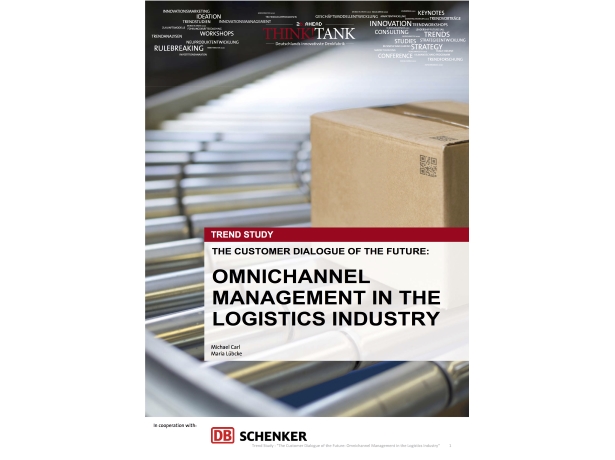Trend Study: Omnichannel Management for Logistics

Omnichannel management places customer relations on an entirely new foundation. Logistics experts who today integrate and connect customer communication across all contact points will build a solid foundation for the future. This will mean decisive advantages – for you or for your competitors!
Beginning in the near future, customers will expect the omnichannel experience. This new form of customer dialogue will shape the world of tomorrow – and with it the expectations customers will place on their logistics providers.
The omnichannel approach will change workflows at the core of your company.
The omnichannel approach will open great new opportunities for logistics providers: as digitalizers for their customers, as coordinators of data flows, and as adaptivity managers.
The logistics industry faces tremendous challenges thanks to customers' changing communication expectations.Technological developments are transforming both the lives and the working environments of your customers. The ever-presence of the mobile and stationary internet, paired with the emergence of technologies such as advanced sensor systems and intelligent prognostics, have led to a transformation in customer behavior. As a result, new communication channels, contact points, and data types are constantly emerging.
Omnichannel management is the response of business to the changes in customer expectations, technological developments, and the transition of our living and working environments. Your customers will obviously expect this flexibility and agility in a few years, and if they do not get it, they will quite possibly seek – and find – it with your competitors.
The goal of the omnichannel approach is to optimize customer dialogue by intelligently connecting the various types of channels and data types. Customers in the future will obviously expect the freedom to begin dialogue with a company at any time and over any channel of their choice. Seamless communication over all channels will be increasingly expected as normal, and will require not only new IT-structures, but also an organizational restructuring of the logistics provider. The players in the logistics industry who do not adjust for this changed customer expectation will be at a considerable disadvantage in the future.
The present qualitative study examines the effects of technological developments and of changing customer expectations on the business models and organizational principles of logistics companies. The foundation of the study is expert interviews with key players, strategy consultants, and innovators from the logistics industry.
Customer data: The most important transported good of the future
Obviously: The logistics provider links the value-added chain and enables customers to handle procurements, shipments, production, and sales; in short: business. This function will take on a new dimension through digitalization and will open up additional opportunities for the logistics company. At the latest with the penetration of adaptive products into the market, the value-added chains will become circular, multidimensional, and complex. Companies across industries are working on adaptive products, services, and solutions: products that are not only highly personalized to the needs of the individual customer, but that also are able to respond to, and to satisfy, changes in customer requirements.
The complexity of this performance promise is huge – and it will grow exponentially as more companies become part of the value-added chain. The successful logistics provider of the future will position themselves at the most important interface in the supply chain and establish their role as its nexus. The provider who enables communication and data flow is in the best position for future business models in logistics.
The foundational transformation of logistics companies
A consistently implemented omnichannel management will cause logistics providers to dissolve their existing workflows. This will mean dividing teams by tasks according to organization, IT, and content, and not as before according to the communication channels. This new approach will also require networked organizational layers instead of fixed responsibilities for individual channels.
Conceive of yourself as your customer's digitalizer: Set up your omnichannel management so that you can also integrate analog interfaces. Offer your analog customers the option to use you as a digital interface to other companies, partners, and customers. In the digital world you are the bridge between analog, semi-digital, and fully digitalized processes and companies.
Download the full study free of charge
Due to our cooperation with DB Schenker, we are able to present this study to you free of charge. Please do not hesitate to contact us or our partner if you would like to use the results of our study to review your strategies. We would love to help.
Make your company future-proof! We would be delighted if this study helps you to do so. We wish you an inspiring read ... and a great future!